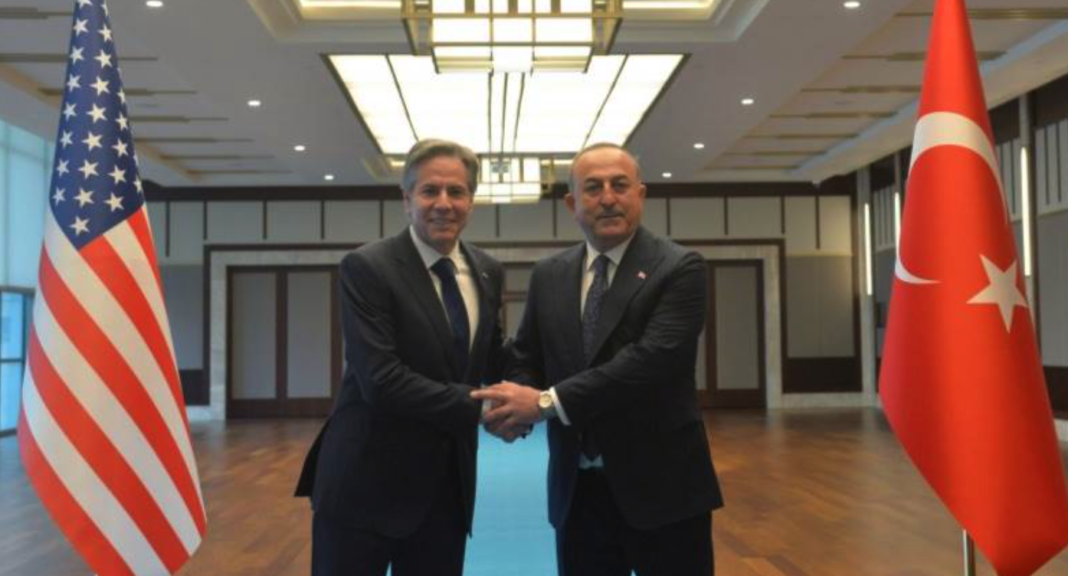The United States and United Kingdom imposed sanctions Wednesday on three Turkish targets as part of the West’s continued effortto “cut off more of the international assets and finance channels still connecting Moscow’s economy to global trade and finance.” While Turkey emphasizes its ongoing commitment to helping Ukraine, Turkish entities continue to defy Western sanctions against Russia, aided by the blind eye that Ankara turns toward many forms of illicit finance. By Sinan Ciddi in Foundation for Defense of Democracies on April 17, 2023.
On April 12, the U.S. Treasury sanctioned two Turkish companies and two associated targets. The first company is Dexias Industrial Products and Trading, whose Russian affiliate, Dexias Limited Liability Company, and general director, Alim Firov, were also blacklisted. Dexias served as an intermediary for a previously sanctioned Russian enterprise, “interact[ing] with Western firms in its efforts to procure U.S.-origin electronic components.”
The second Turkish company, Azu International, is responsible for facilitating the sale of “multiple shipments of foreign-origin electronics technology such as computer chips.” Additionally, recently leaked U.S. intelligence sources point to Turkey’s possible attempts to sell weapons to the Russian mercenary company, the Wagner Group, which is contracted by the Russian government to fight in Ukraine.
Top U.S. officials have warned Ankara multiple times about the risks of a permissive attitude toward illicit finance. In 2022, Brian Nelson, undersecretary of the Treasury for terrorism and financial intelligence, met with Turkish and Emirati officials and business representatives. Nelson warned the Turks, as he did the Emiratis, that “individuals and institutions operating in permissive jurisdictions risk potentially losing access to G7 markets on account of doing business with sanctioned entities.”
Also in 2022, Deputy Secretary of the Treasury Wally Adeyemo issued verbal and written warnings to the Turkish government and associated business organizations to stop enabling Russian financial transfers. In response, Turkish state and private banks terminatedtheir use of Russia’s “Mir” payment system — Moscow’s alternative to SWIFT. Last month, Turkish officials, in collaboration with their American counterparts, took joint action to designate four individuals and two entities tied to the Islamic State (ISIS) for enabling “the terrorist group’s recruitment and financial transfers to and from Iraq and Syria.”
Despite these two instances of cooperation, there are signs that Turkey remains a permissive jurisdiction for illicit finance and sanctions evasion. On seven different occasions from 2019 through 2021, Treasury imposed sanctions on Turkey-based persons who were part of ISIS, Al-Qaeda, and Hamas financial networks. In December 2022, Treasury designated Sitki Ayan, a Turkish businessman and acquaintance of Turkish president Recep Tayyip Erdogan, for facilitating “the sale of hundreds of millions of dollars’ worth of oil for Iran’s Islamic Revolutionary Guard Corps-Qods Force (IRGC-QF).” Additionally, U.S. authorities pressured Ankara last month to prevent Russian airlines from flying American-made civilian airliners to and from Turkish airports, warning that “Turkish individuals are at risk of jail time, fines, loss of export privileges and other measures if they provide services like refueling and spare parts to U.S.-made planes flying to and from Russia and Belarus in violation of export controls.”
Washington must continue to pressure Ankara not to play both sides: On the one hand, Turkey is seemingly supporting Ukraine by selling it combat drones. On the other hand, Ankara continues to evade Western sanctions by permitting Turkish entities to supply Russia with critical electronic equipment and selling weapons to Russian-affiliated mercenary groups. Turkey will hold national elections on May 14 to determine its next leader. U.S. officials should clearly communicate to both incumbent President Recep Tayyip Erdogan and the country’s opposition leaders that continued support of Russia’s war efforts in Ukraine will result in additional sanctions.
Sinan Ciddi is a non-resident senior fellow at the Foundation for Defense of Democracies (FDD), where he contributes to FDD’s Turkey Program and Center on Military and Political Power (CMPP).
By Sinan Ciddi in Foundation for Defense of Democracies on April 17, 2023.

